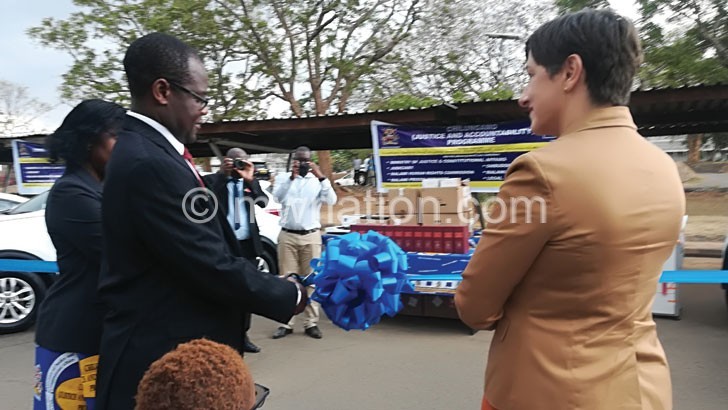EU cautions against aid dependency
EU Ambassador Sandra Paesen has urged Malawi to move towards trade for development and not just consumption to be on track to achieve Sustainable Development Goals (SDGs).
The EU envoy was speaking Lilongwe yesterday when she handed over 16 motor vehicles worth about K344 million and 43 motorcycles valued at K113 million to governance institutions benefitting from the Chilungamo (Justice and Accountability) Programme.

Her observation comes at a time Minister for Finance, Economic Planning and Development Goodall Gondwe is expecting to receive budgetary aid from the EU and World Bank to prop up the K1.3 trillion 2018/19 National Budget which has a deficit of K243 billion out of which K67 billion is projected to be financed from foreign resources and K176 billion from domestic resources.
However, in an interview yesterday, Paesen said much as aid has been instrumental in many developing countries like Malawi owing to the needs they have, it is high time the country graduated from heavily relying on donor aid but rather it should embark on trade for development.
She said: “Aid has been very useful to countries like Malawi which has pressing developmental needs. But the point I am making is that in the modern world, the post 2020 world, I think easy loans cannot bring all developmental answers. What we need is the economic side to develop trade. We want trade and economic development. We want jobs, growth and economic opportunities in Malawi.”
Emphasising her point, Paesen noted that aid has been part of the budget to Malawi but it has not been consistent enough to spur development and create jobs for Malawians.
But in an interview yesterday, Economics Association of Malawi (Ecama) president Chikumbutso Kalilombe argued that it is not easy for Malawi to graduate from donor dependence, citing missing links on technological advancement as one of the challenges that can derail Malawi.
While acknowledging that trade is key to making the country economically independent, he stressed the need to develop basics that may lead to economic growth.
Said Kalilombe: “Graduation from aid dependency does not just happen as an event. As Malawi, we need to work on it continually. This, therefore, means developing appropriate technologies and access to finance should be some of the steps taken towards this.
“Aid which helps us carry out social services that we should have been able to do ourselves if we had developed as a country should shame us into action. Trouble is that at times we seem to be in a comfort zone.”
During his tenure in office, former president the late Bingu wa Mutharika continuously preached the need for Malawi to move away from donor dependency. That time, donors financed about 40 percent of the recurrent budget and at least 80 percent of the development budget.
He also envisioned the country transforming from a predominantly importing and consuming nation to a producing and exporting economy.
In his response to a WhatsApp questionnaire, Catholic University of Malawi economist Gilbert Kachamba backed the EU Ambassador, but he said the country does not have the capacity to produce enough to replace aid.
Paesen is not the first foreign envoy to make such sentiments. In June 2016, former German Ambassador Peter Woeste said donors were not happy with Malawi government policies because Malawians were becoming poorer despite the country receiving $1 billion per year for poverty reduction.
Attempts by the government to go at it alone without donor aid, ‘Zero Deficit Budget’ did not yield the desired results but resulted in increased domestic borrowing from which the government is yet to recover.





